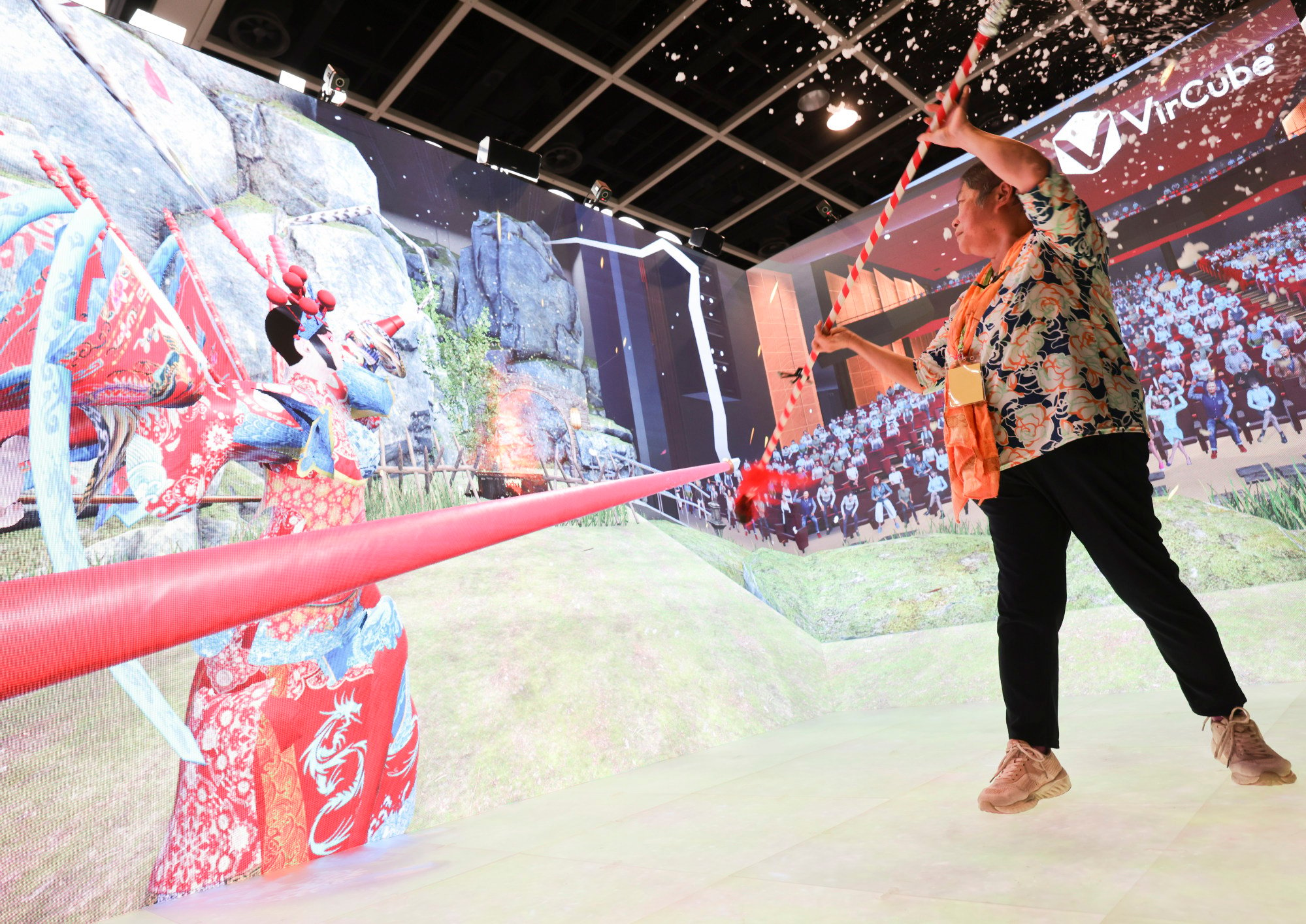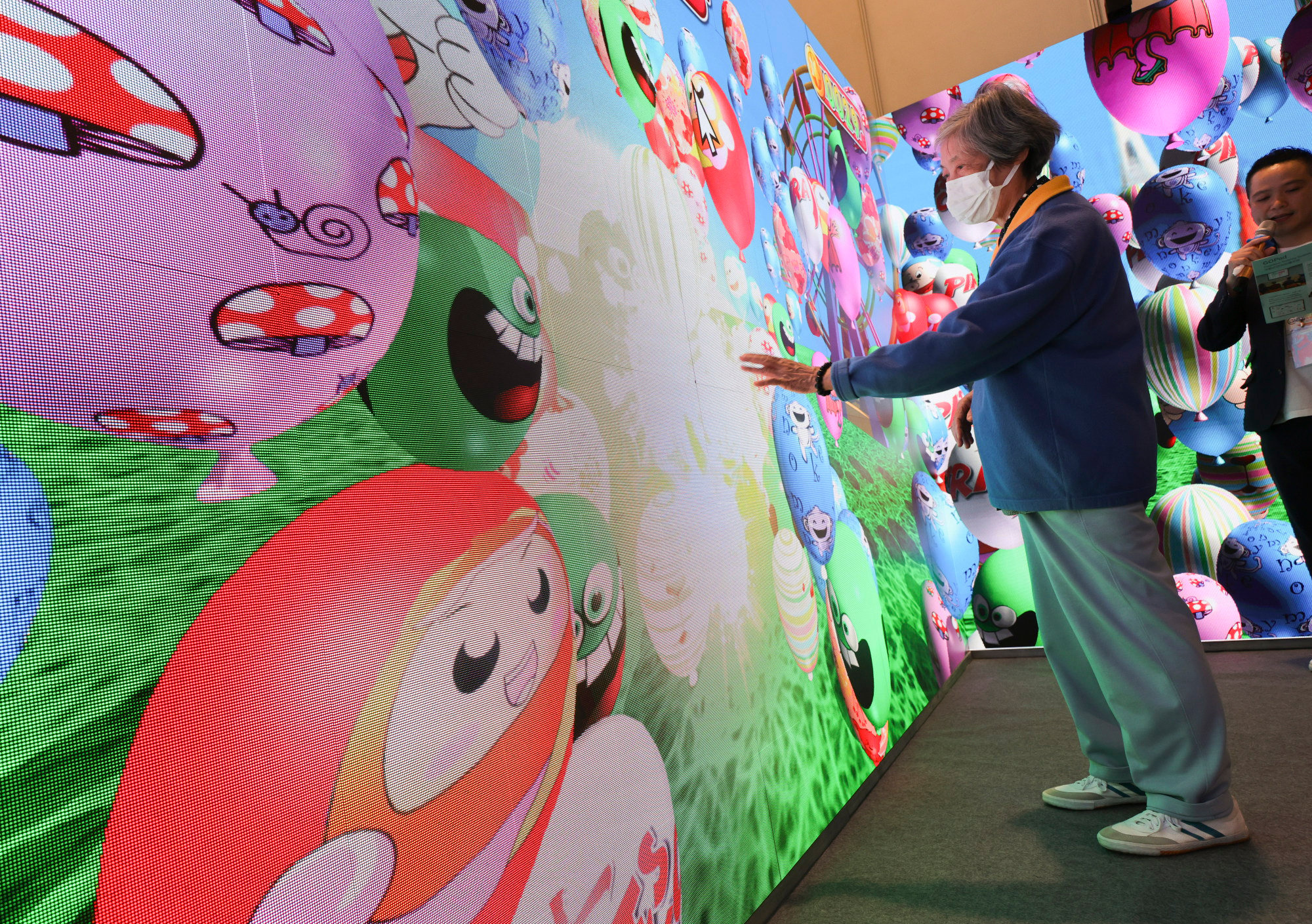How extended reality can keep older Hongkongers moving and battling real-life foes
[ad_1]
Housewife Sherra Ho has never taken part in a Cantonese opera battle on stage, but she had her first taste of the experience using extended reality in Hong Kong on Thursday.
Choosing a spear as her prop, she stood in an “arena” shown on massive digital screens surrounding her and swung the weapon according to instructions, striking her opponent 13 times.
“It was a really fun game. I have not been so thrilled in a long time,” the 66-year-old said after two rounds. “I have to stop. If not, I may get addicted to it.”

The game hosted in the VirCube XR Space was one of 800 creations showcased at this year’s Gerotech and Innovation Expo at the Hong Kong Convention and Exhibition Centre. The company behind the game said it hoped to provide older residents with new sensory experiences that included a short physical workout using mixed reality
“Many residents can only watch TV as their only activity, which can be boring,” said Motive Force CEO Terence Tseng Chun-hung. “This immersive system can help older residents kill time and be physical simultaneously.”
Sensors inside the spear and the extended reality space could also help assess the participant’s mobility, he added.
The Hong Kong Council of Social Service, which co-organised the expo, said the four-day event had attracted a record-breaking 200 local and overseas exhibitors.
“We remain more committed than ever to embrace challenges and opportunities in the post-pandemic new life,” council chairman Bernard Chan said. “We look forward to exploring how cities in the Greater Bay Area can collaborate and co-create communities designed to meet the needs of our precious senior citizens.”
Robots and sensors to help elderly – but out of their price range
Robots and sensors to help elderly – but out of their price range
The bay area is Beijing’s plan to integrate Hong Kong, Macau and nine mainland Chinese cities into an economic powerhouse.
City leader John Lee Ka-chiu said in his policy address last month that the government would earmark an additional HK$1 billion (US$128 million) from its innovation and technology fund for gerontechnology products suitable for home use in the next financial year.
On Thursday, Secretary for Labour and Welfare Chris Sun Yuk-han expanded on Lee’s plan at the expo, saying Hong Kong must “make good use of technology” as society greys.
The minister noted that Hong Kong currently had one resident aged 65 or above for every 4½ people, and one in every 20 people was 80 or above.
“From the government’s perspective, we must face this challenge in all aspects and seize this opportunity … to make the lives of the elderly better and to make life easier for their carers,” he said.
To make gerontechnology a “huge success” in Hong Kong, authorities would have to ensure such innovations were affordable, fit for purpose and easy to use, he added.
More elderly Hongkongers had access to smartphones in 2021, survey shows
More elderly Hongkongers had access to smartphones in 2021, survey shows
Hay Young, creative director of IF Interactive, a local tech firm dedicated to therapy and education solutions, said that despite charity and corporate funding, Hong Kong was still not ambitious enough in promoting its home-grown products to global markets.
“There is a big enough user base to facilitate cutting-edge research, but whether we can expand it into a test bed for production and new technology remains a question,” he said.
Young’s company cooperated with City University about 20 years ago to develop interactive systems to help students at special schools using art and multisensory therapies.
He said they developed the iSensory Room technology for cognitive training and exercise rehabilitation for the elderly during the Covid-19 pandemic. Simulations of flying on a plane or using public transport gave the residents the feeling of being outside, allowing them to feel they were still connected to society, he explained.
The Hong Kong Japanese Chamber of Commerce and Industry also took part in the expo for the second time, which vice-president Kenichiro Washikita attributed to the “positive reviews” received last year.

The chamber showed a mobility support robot called Hug, which helps lift wheelchair patients in about 20 seconds, reducing the strain on carers.
Chui Yuet-king, a 75-year-old retired teacher, was among the visitors to Thursday’s exhibition, but she expressed disappointment over the limited number of products offered which the elderly could operate alone.
“I don’t need other people to help me with my daily routine, but I want to see more products that I can use by myself and make my life easier,” she said. “I felt sad seeing those walking frames, purée food and nursing beds. I think I still have a long way to go.”
[ad_2]
Source link





